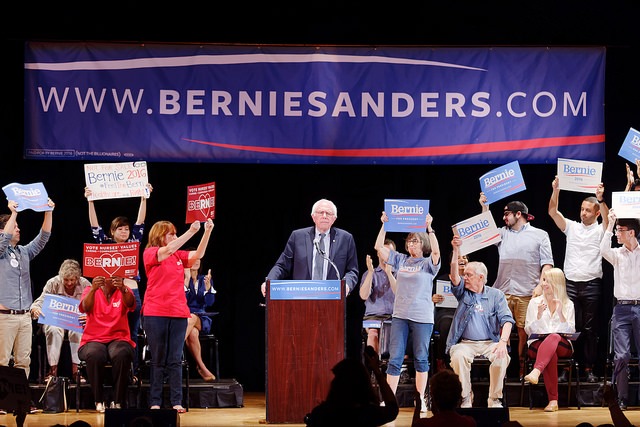Public support lies with Sanders, regardless of misleading polls
3 min read
By ANDY UNGER
As we listened to political analysts following last weeks Democratic debate, almost every major news source said that Hillary Clinton “won” the first debate, from the Wall Street Journal to TIME magazine. The entire evening was claimed as a victory for her candidacy.
It is early in the race, the polls have yet to level out, and if we are being honest, a majority of Democrats simply love Hillary Clinton. So what is wrong with these articles?
The problem lies in the polls. After the debate, almost every major news source opened up a poll to find out who the majority of viewers believe to have won. CNN put up a poll on Facebook, and Slate, MSNBC and Fox embedded polls in their articles on the topic. If TIME magazine was right about Clinton having “won” the debate, then surely we could expect to see her name surging in the forefront of viewers’ hearts and poll votes.
But that was not the case. Clinton, in fact, averaged around 14 to 15 percent in every single poll. So who was the frontrunner after the Oct. 13 debate? None other than Bernie Sanders, the self- proclaimed voice of the people.
His scores ranged from 67 to 79 percent in the major polls. In fact, these polls are still available to view, and the numbers have only risen since the debate day.
Further, several focus groups from CNN, Fox and Fusion declared Sanders the winner. In the Fox focus group, for example, almost half of the group walked in Clinton supporters and left supporting Sanders. So why does the media blatantly ignore this? One theory suggests that Clinton’s supporters have ties in the media.
For, Time Warner, which is the cable company that owns CNN, supports Clinton and her campaign and people are starting to believe that CNN cannot write anything bad about her. Which is probably not true, but it does seem to question their coverage scope.
In my opinion, there is just a major difference between public support and the coverage of it. Sanders has the public support while Clinton, however, is the star in the eyes of political theorists. The new question that arises is, which kind of support will win the primary?
In theory, it should be public support that allows a candidate to move into the general election and further, even to the White House. In practice, it is hard to tell. There have been presidential elections in which the popular vote went to the losing candidate.
Again, it is still way too early to make primaries predictions, but with every debate we are getting closer. Jim Webb and Lincoln Chafee have dropped out of the race entirely, leaving only three major Democratic candidates: Clinton, Sanders and O’Malley.
Clinton, smothered in love by people who live and breathe politics all day where Sanders is building up more support from everyday people, such as middle class workers, at a rather rapid pace.
The only thing that is absolutely certain is that the next debate is to be sure to witness a wild one, for everyone involved. I can only hope that this time, the big leaguers recognize Sanders as coming out on top.



I did not like this article.
“It is early in the race, the polls have yet to level out, and if we are being honest, a majority of Democrats simply love Hillary Clinton. So what is wrong with these articles?”
Hillary Clinton is not loved by a majority of Democrats; a majority of Americans do not trust her (http://elections.huffingtonpost.com/pollster/hillary-clinton-favorable-rating). She was soundly rejected in 2008 for being an unprincipled hack without any kind of political instincts. In 2016, she is older, more tone-deaf and more out of touch with the party base.
And it doesn’t matter.
Hillary has won the nomination; Bernie Sanders is not a serious candidate and will not win a single primary. The only chance Sanders had — to knock her for the email scandal — he squandered, effectively disemboweling his campaign. Despite how the people might feel about Sanders, the DNC decided long ago that Hillary would be their candidate and their best shot at winning in 2016, which, while not incorrect, is a sign of just how much trouble the Democrats are in for 2016.